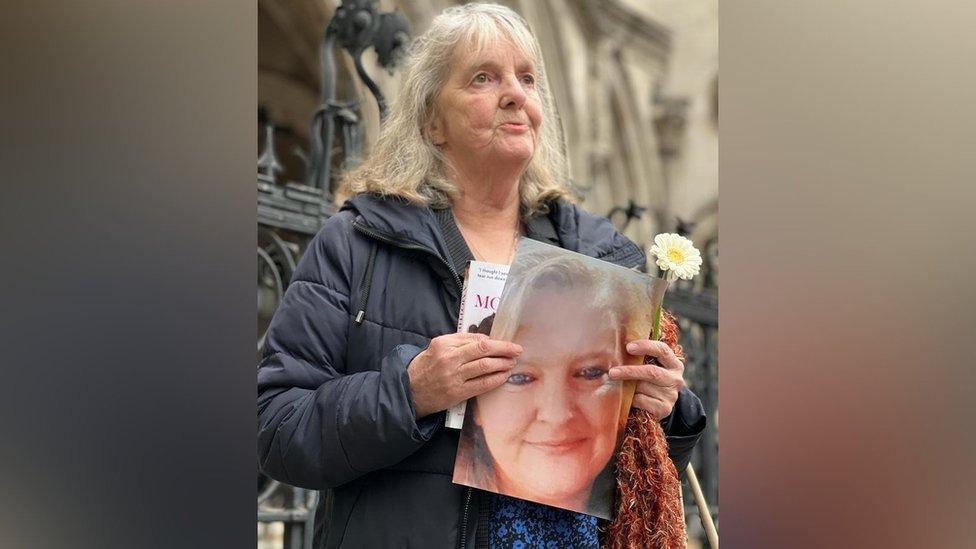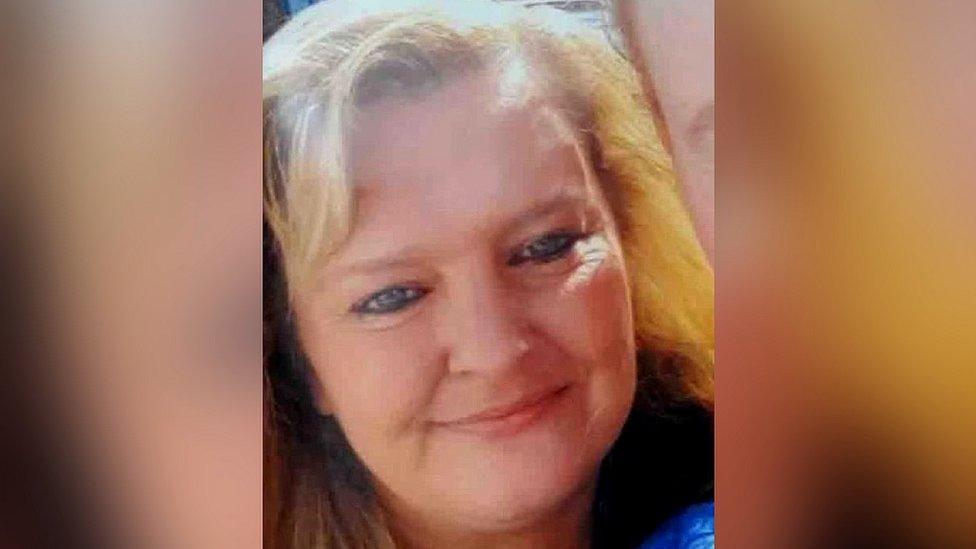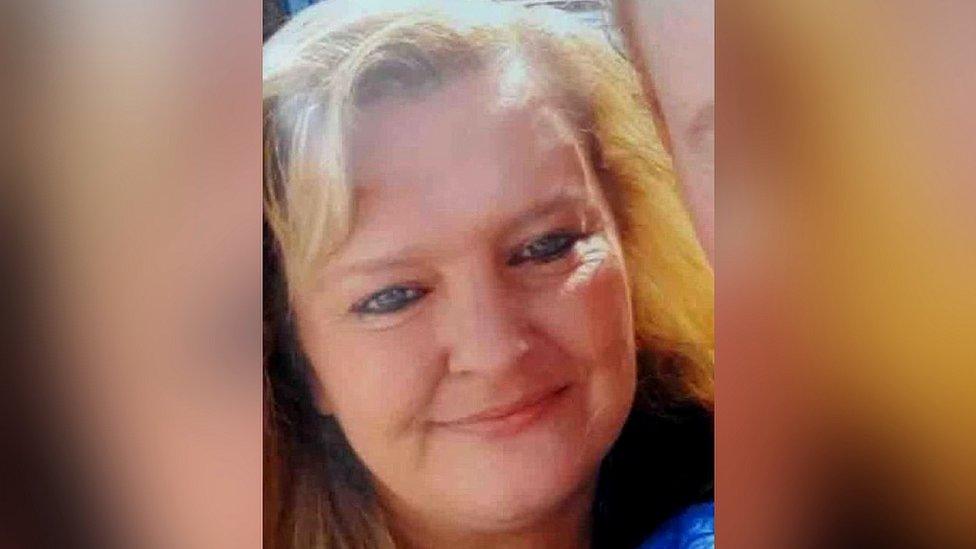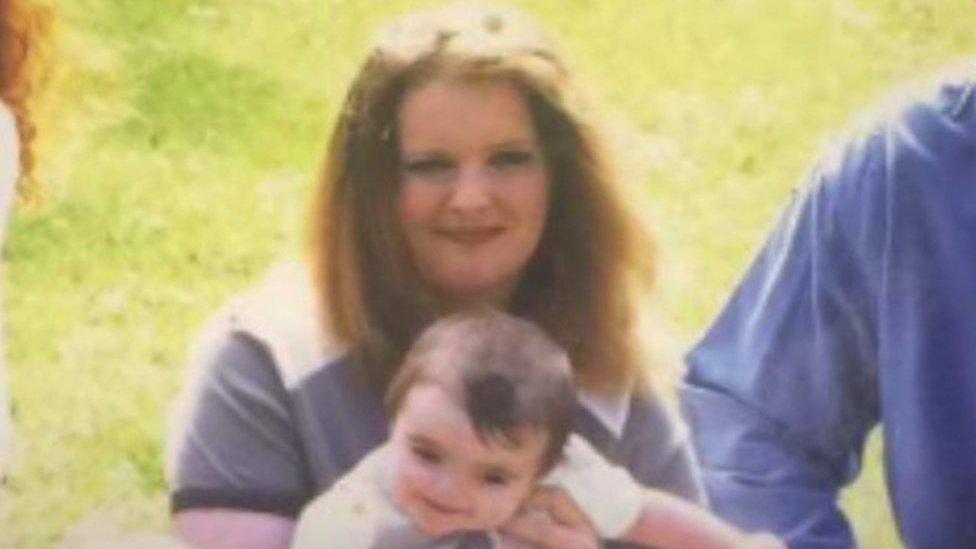Jodey Whiting: Court of Appeal considers new inquest
- Published

Joy Dove is at the Court of Appeal calling for a fresh inquest into her daughter Jodey's death
Appeal court judges have retired to consider whether to grant a new inquest for a woman who took her own life after her benefits were wrongfully cancelled.
Jodey Whiting, 42, from Stockton, died in February 2017 - days after her disability benefits were stopped by the Department for Work and Pensions (DWP).
A coroner ruled her death was suicide, but her family want the DWP's impact to be investigated at a new inquest.
DWP lawyers told the Court of Appeal the department accepted failings.
Ms Whiting's 2017 inquest lasted 37 minutes and was conducted by Teesside and Hartlepool assistant coroner Jo Wharton in what was known as a Jamieson hearing - designed to only establish who the deceased was and how, when and where they died.
Her family are arguing it should be held again - as a so-called Article 2 inquest, which has a much wider scope and is held where there is the potential an official body, in this case the DWP, is in part responsible for the death.

Jodey Whiting had a history of chronic pain and mental health issues which left her unfit to work
The DWP has previously admitted failings in Ms Whiting's case and apologised to her family, but its lawyer Jonathan Dixey KC told the court it did not have an "operational duty" towards Ms Whiting under Article 2, the right to life, of the Human Rights Act, so an Article 2 inquest was not appropriate.
Errors identified by an Independent Case Examiner, external (ICE) review included ignoring Ms Whiting's request for home visit.
It also said officials did not telephone or make welfare checks when she failed to attend a face-to-face meeting which she had told them she was incapable of and which led to the cancellation of her employment support allowance (ESA) and other benefits.
The DWP also knew of her history of mental health problems including expressions of suicidal intents but failed to follow its own safeguarding guidelines for dealing with such vulnerable people.
Mr Dixey KC told the court the department "recognise the intense hurt" of Ms Whiting's family and accepted the criticisms made in the ICE review, but the "state does not owe a general obligation to prevent a person committing suicide even if the authorities know or ought to know of real immediate risk".
Mr Dixey said the DWP "interacts" with about 20 million people a year, many of whom have physical or mental health issues, including the "sadly uncommon" expression of suicidal thoughts.
He said neither "the regulations nor policies and procedures amount to an assumption of responsibility by the department to prevent a recipient of ESA from taking their own life".
He said the DWP "did not exercise sufficient control" over Ms Whiting for the department to be classed as having an "operational duty" for her.
'Shocking failures'
In response, Jeremy Hyam KC, representing Ms Whiting's family, said the "maladministration" of the DWP meant in her case they did have Article 2 duties.
He said the DWP knew a "total cessation of benefits for a highly vulnerable people" would increase the suicide risk, adding: "It is reasonably foreseeable to the department that might have dire consequences for the individual and put them in a state of desperation."
Mr Hyam said that meant the department had a "very narrow but nonetheless important degree of control and responsibility", adding in Ms Whiting's case the "cessation because of the shocking failures pushed [her] into a mental state of total desperation such that she took the ultimate step and took her own life".
Mr Hyam previously said there were two new pieces of evidence that were not available to Ms Wharton, namely the damning ICE review and a psychiatrist's report which said the withdrawal of her benefits was "likely" to have contributed to her decision to take her own life.
'Difficult drawing lines'
Jonathan Hough KC, representing Ms Wharton, said the original inquest achieved what it set out to.
Mr Hough said he accepted it was "difficult" drawing lines but it would be a "step beyond" for a so-called Jamieson inquest to "go into the motivations of a person to the end their life".
The Court of Appeal judges said the coroner could decide in each case whether or not it was necessary or in the public interest to look at causes of suicide.
Mr Hough said it would get difficult as the DWP could argue any future coroner would have to look at how other factors - including family problems or her chronic pain - impacted on Ms Whiting's mental health, along with the cessation of benefits.
Ms Whiting's family, led by her mother Joy Dove, are appealing against the High Court's refusal to grant a new inquest.
Before retiring to consider their verdict, Lord Justice Lewis said he and his fellow judges Lord William Davies and Lady Justice Whipple had "not forgotten at the heart of this case is Jodey".
He told Ms Dove: "We know how much she was loved by you and all her family."
He said he did not know long how it would take for them to reach a decision.

Follow BBC North East & Cumbria on Twitter, external, Facebook, external and Instagram, external. Send your story ideas to northeastandcumbria@bbc.co.uk, external.
- Published31 January 2023

- Published5 October 2022

- Published3 November 2021

- Published1 October 2021

- Published17 September 2021

- Published22 June 2021
